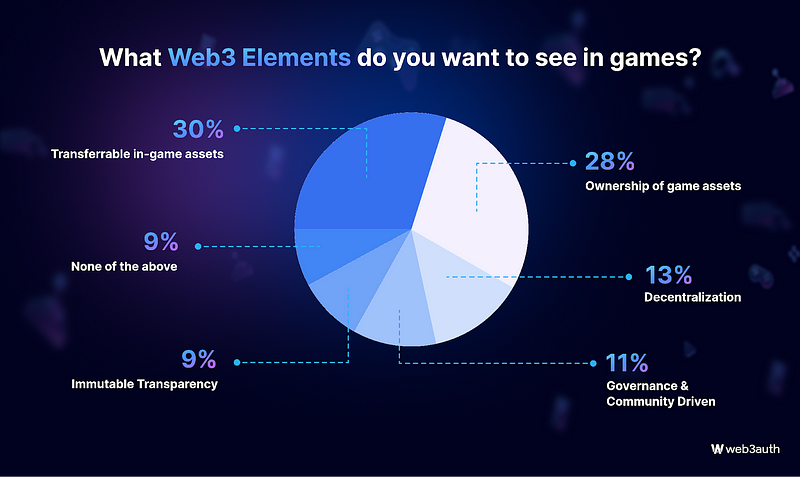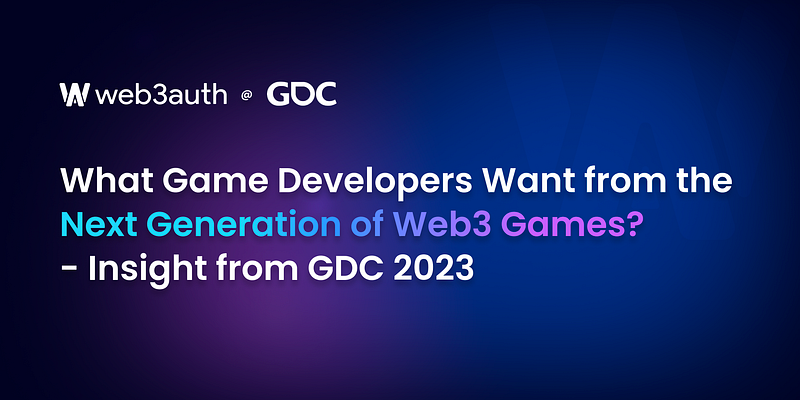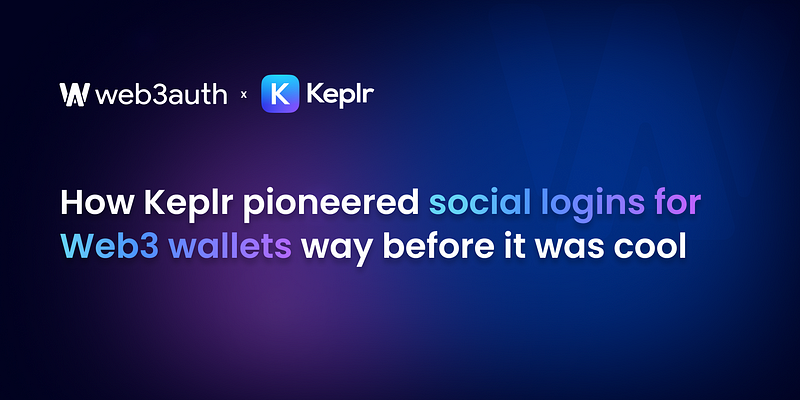According to the GDC survey 2022, 75% of game developers are not interested in web3 blockchain technology https://gameworldobserver.com/2023/01/20/gdc-survey-50-of-game-devs-skeptical-of-metaverse-negative-about-consolidation. We were shocked by this high number before going to display our booth at GDC 2023. And we are interested in digging the reason behind the hesitation of adopting Web3 elements in their games.
We had some hypotheses going into the research — Game developers may not see the advantages of adopting web3 technologies due to a lack of information. By understanding more about how their games can work with the web3 ecosystem, they’ll be more likely to adopt it.
We also hope by pinpointing what game developers want in their games, we can give feedback to existing developers — on what web3 elements they should focus on, as well as improve web3auth’s products to meet developers’ needs.
To test our hypothesis, we conducted a live survey at GDC 2023 to gather insights into “What Web3 elements do you want to see in games?”
278 responses were received and here’s what we found:
Top Web3 elements Wanted in Web3 Games (See image below)
- Transferable in-game assets: 30% (83 votes)
- Ownership of game assets: 28% (79 votes)
- Decentralization: 13% (37 votes)
- Governance and community-driven features: 11% (32 votes)
- Immutable transparency: 9%(25 votes)
- None of the above: 9% (22 votes)

Let’s take a closer look at what these web3 elements mean and why game developers are interested in them.
Transferable In-Game Assets
The ability to transfer in-game assets between different games or platforms was the most popular choice among respondents, with 30% of participants expressing their interest. Many games spend a lot of time and effort obtaining certain items in a game, and it seems wasteful if these items are stuck in a game that will eventually die off. And this element was seeing as the most potential in web3 gaming although no game studios is doing or willing to do it now.
Therefore, transferable in-game assets may revolutionize gaming across the board, especially if gamers can still retain precious assets from previous games. Although it is difficult to achieve for developers and requires game studios to collaborate with each other, many gamers want to have this feature.
Some highlighted feedback from the game developers in GDC
- Game studios are not going to want to collaborate with each other to have this system of transferring assets between games. It’s too challenging.
- Seems like our technology is not yet there to be able to support this, even in the web3 world
- Users would very much like to own their own assets in the game, something more tangible instead of having something that is just existing there. They would like to show it off like a collectible if possible
- This is the main reason why I see potential in web3 gaming. But while there is so much hype on how you can switch items from one game to another, no games are doing that right now. It would be cool if I could use call of duty items for Fortnite, but it is not being done right now.
- Thinks that having this is something that can revolutionize gaming across the board especially with the ability to still retain assets that are precious to them in previous games
Ownership of Game Assets
The ownership of game assets is a popular choice among gamers, with 28% of respondents selecting it as a key feature. Gamers are becoming increasingly interested in owning their in-game assets and keeping them beyond the life of a game. As web3 advances, gamers are likely to want to own their own assets and stuff, which could be a driving force for the future of gaming. There is also the potential for game licenses to become transferable so that players can rent out their game licenses to other players once they’re done playing with it.
Some highlighted feedback from the game developers in GDC
E.g. Pokemon previously had special editions of 10 mews in the game. Some people had it but its stuck in the old cartridge and its gone after that
- Seems like it’s for the money — negatively associate it to NFTs
- Feels that users who vote this would look at money-making opportunities that their in-game item can give them
- See the point of ownership cause that’s where technology is going nowadays. Users are going to want to own their own assets and stuff.
- Sees a use case to bring ownership beyond game assets to game licenses, where players can rent out their game licenses to other players once they’re done playing with it
Decentralization
Decentralization is an important Web3 feature for gamers, with 13% of respondents selecting it as a key element. Gamers like the idea of decentralization because it can help prevent them from suffering as collateral damage because of a particular big entity when it’s not their fault. However, there were also some respondents who thought that there still needs to be some sort of centralization in games, especially with servers and governance.
Some highlighted feedback from the game developers in GDC
- There still needs to be some sort of centralization in games. Decentralisation is not as important because its very seldom that games goes down
- Decentralization is the most promising because right now games are still on centralized server and if the game goes down, everything else goes down
- Some things need to be centralized, especially for games. Games shouldn’t decentralize everything esp like servers or governance.
- Decentralization is always important because we should not suffer as collateral damage because of a particular big entity when its not our fault
- Decentralization doesn’t seem to be that big of a deal esp when it comes to games because it’s rare that gamers would spend tens of thousands on a game. Usually its money that they are willing to spend and give up
Governance and Community-Driven Features
While governance and community-driven features were only chosen by 11% of participants, there were still a significant number of respondents who expressed an interest in this area. Some gamers liked the idea of having a community-driven game, while others believed that there needs to be some sort of owner for games. However, there were some who thought that governance could be too inefficient, and it could erode the essence of the developers who created the game.
Some highlighted feedback from the game developers in GDC
- Governance may be good for some use case where everyone can get a say in the game development but it’s just too inefficient
- Governance is not that important because you can do whatever you want with the game, it doesn’t affect me
- There needs to be some sort of owner for the games. If not the game would not be able to develop — i would play certain games because of the developer that created the game due to their style/concept. If we were to allow everyone to contribute then the essence of the developers who created this game would be lost/eroded
Immutable Transparency
Immutable transparency is not as popular as other features, with only 9% of participants selecting it as a key web3 element. However, some gamers believe that a game that is transparent would be very helpful, especially since there have been instances where games modify the game without transparency. Modding is the essence of the game, and most mods enhance the game.
Some highlighted feedback from the game developers in GDC:
- Games are already currently trying go curb that in house
- Modding is the essence of the game
- There have been instances where games will modify the game and it hasn’t been very transparent which makes us trust games less. I think a game that is transparent would be very helpful
None of the Above
There were also some respondents who indicated that none of the web3 elements are important to them. While they believe that these elements can be very much possible as technology advances, they have not yet seen them being used effectively in any web3 games. They also think that these elements are already being solved without the use of web3 technology.
General Sentiments/Comments
Apart from the features mentioned above, we also gathered some general sentiments and comments from the survey respondents:
- The survey revealed that most Web3 games are seen as repetitive and gambling-like. Respondents felt that the focus was solely on making money and not on the essence of the game. The barrier of entry to these games is also high as most are pay-to-play.
- Moreover, some respondents felt that the technology already existed, and there was nothing new that Web3 technology could offer that Web2 could not solve. There was a lack of understanding of the use cases for each of the categories.
- However, the survey found that most gamers see the potential of what Web3 can bring to games if it is executed well while still retaining the essence of the games. Additionally, the majority of respondents voted for ownership of game assets or transferable in-game assets because they see more potential in these elements being used in gaming
- Most users who voted for none of the above felt very strongly about not having Web3 in anything, not just games. On the other hand, the survey revealed that more gamers want to see Web3 elements in games rather than none of the Web3 elements.
Insights and Findings
- The survey revealed that most gamers see the value of what Web3 can bring to games if executed well while still retaining the essence of games.
- The survey also found that more game developers and gamers want to see Web3 elements in games rather than none of the Web3 elements. This suggests that game developers should consider integrating Web3 technology into their games to meet the changing expectations of gamers.
- The survey also highlighted the importance of ownership of game assets or transferable in-game assets as a use case for Web3 technology. This can enable players to have true ownership of their in-game assets and monetize them outside the game.
Why Web3Auth is the Right Choice for Game Developers
- Web3Auth offers game developers a seamless onboarding experience to the world of Web3 technology. Our platform provides easy-to-use solutions for developers who want to integrate Web3 technology into their games. We have a team of experts who are passionate about Web3 technology and gaming, and we can guide game developers through the integration process.
- Web3Auth can help game developers implement the ownership of game assets or transferable in-game assets, which is an important use case for Web3 technology. Our platform also enables game developers to create transparency features, such as blockchain-based smart contracts
If you are interested in learning more about our gaming capabilities, schedule a demo with us today.





